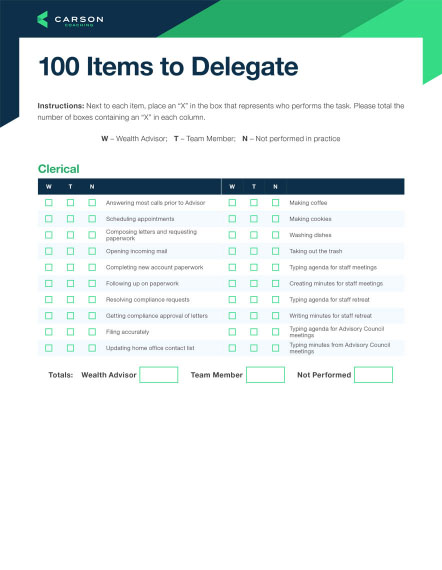4 questions to start asking prospective clients now
After reading the title of this blog, you might be thinking to yourself, “We don’t talk about emotions with clients!” And, if you’re saying this, then it’s true – you might not talk with your clients and prospects about how they’re feeling.
But whether you talk about emotions or not, they’re constantly at play in every human interaction. We can’t avoid them. Humans are emotional beings. Most advisors who are thriving today realize this truth.
The question you must ask yourself and subsequently answer for yourself: Do I want to thrive or survive?
Initially, this might sound like a silly question. Of course you want to thrive! But are you willing to step out of your comfort zone to thrive?
Step Out of Your Comfort Zone
Many financial advisors got into this business because they enjoy understanding the intricacies of financial planning and wealth management. I often ask the advisors I coach how they talk with clients and prospects about emotions. Very often, the response is, “I don’t.”
The reasons?
“It’s not comfortable.” Or, “That’s not something I’m used to.”
If you never use a muscle, it cannot be strong. This “muscle” of asking other people – prospective clients – about their emotions must be intentionally worked on and strengthened through repetition.
Why is this important?
People make decisions based on emotions and then justify those decisions with logic. When you’re working to convince a prospective client to work with you, if you’re able to elicit and understand their emotions, you’ll put yourself in the best possible position to motivate them to make the decision that you’re convinced they need to make.
Humans innately want to feel seen and heard. If you can give your prospects the sense that they’re being seen and heard by you, you will elevate your rapport and increase your chances of moving them to action.
How comfortable are you asking emotion-eliciting questions of other people?
If you’re like most people, this likely isn’t a muscle you use very often.
When you go to a personal fitness trainer after years of a sedentary lifestyle, the trainer will likely hand you light weights – they won’t ask you to lift the heaviest weight possible because you’re just getting started. They want you to ease into it so you can sustain the effort over a period, not just for one session.
When you’re trying something new, the best way to move in the right direction is to take the smallest, simplest step in that direction. Here are four simple questions that you can ask to help you move outside of your comfort zone and start talking emotions with prospects. Let these questions act as starting points, or templates, for the bolder, better questions that you’ll ask as you move further into this world of emotions with your prospects.
1. How are you feeling about everything that’s going on?
This is a softball. I hope you hit it out of the park. It’s a simple question that you might already ask prospects. But as you now intentionally ask this question, you can be more attuned to the prospect’s feelings and emotions that bubble up in his or her response.
You might notice how general this question is, e.g. “about everything that’s going on.” This is purposeful. Questions direct attention.
If you direct your prospect’s attention to a very specific area within “everything that’s going on,” your prospect’s response will fit within that frame of reference. If, on the other hand, you keep the question broad, as suggested, you’ll learn what the client views as most important within the greater context of “everything that’s going on.”
Keep your question general and allow your prospect to be the one who highlights what is grabbing his or her attention in that moment.
2. What is your biggest fear about this decision that you’re considering?
Fear is the most influential emotion that drives our decisions and behaviors. If your prospect will label his or her fear, you will gain an enriched perspective of the situation. Once you have this enriched perspective, you’ll be able to help your prospect navigate the decision more effectively.
If you’re not clear on what truly is driving the prospect’s decision, you’re just guessing. Wouldn’t you prefer to know by asking directly rather than spend time and energy guessing how a prospect is feeling?
3. What most excites you about this decision?
Like fear, excitement is a motivating emotion. Unlike fear, excitement is an emotion people want to move toward. By asking this question, you help the prospect get into a state of excitement.
Humans are fascinating. We can feel an emotion simply by thinking a thought. You can guide someone’s focus by asking questions. A person will automatically feel the rumblings of any emotion if they’re asked to think about it. When someone more deeply associates excitement or any other high-energy, positive emotion with an action, they will feel more motivated to move in that direction.
4. And what else?
This is such a simple, yet powerful question to ask your prospects after they share something with you.
Often, there is more behind what someone is saying. Most people need to feel that you truly want to listen to what they have to say before they share the full picture. By asking “What else?” you’re inviting your prospects into a safe space where they can share their thoughts and feelings with you.
The key to asking this question well is to ask in a sincerely curious way. Don’t ask it in a tone of voice that says, “I’m just trying to check a box.” Give your prospects the sense that you truly want to hear more from them – because you do!
Remember, silence can be your most powerful tool for connecting with another person. Instead of rushing into the next thing you want to say or share, pause. Give your prospects ample opportunity to share.
Your next step.
You now have four simple, powerful questions to ask prospective clients that will help you to more quickly connect with them at an emotional level. Don’t complicate this. As world-famous life and business strategist Tony Robbins says, “Complexity is the enemy of execution.” And execution is the only thing that will produce results.
Remind yourself daily that you’re in the emotions business. The more you believe this, the more you’ll act on it. The more you communicate with this concept in mind, the better you’ll be at connecting with and converting prospects into clients.
Everyone needs a coach – they act as a guide to help you blueprint your business and your life. Schedule a complimentary coaching call today to learn how you can grow your firm.


